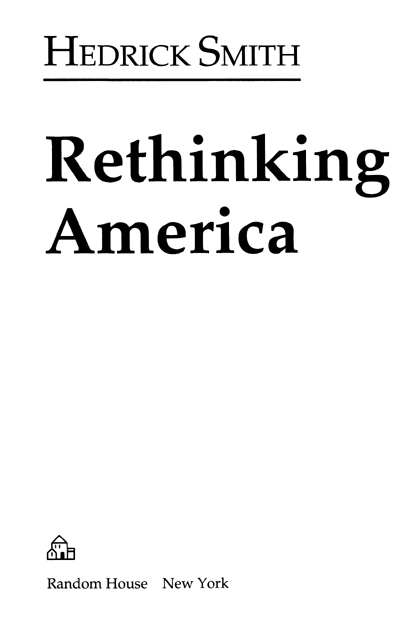Copyright 1995 by Hedrick Smith
All rights reserved under International and Pan-American Copyright Conventions. Published in the United States by Random House, Inc., New York, and simultaneously in Canada by Random House of Canada Limited, Toronto.
Library of Congress Cataloging-in-Publication Data
Smith, Hedrick.
Rethinking America/Hedrick Smith.
p. cm.
eISBN: 978-0-307-82942-9
1. Benchmarking (Management)United States. 2. Technological innovationsEconomic aspectsUnited States. 3. United StatesEconomic conditions1981- 4. United StatesEconomic policy19811993. 5. United StatesEconomic policy1993
6. Competition, International. I. Title.
HD62.15.S62 1995
338.973dc20 94-46664
v3.1
Also by Hedrick Smith
The New Russians
The Power Game: How Washington Works
The Russians
To Jason Fuller
and the next generation of Americas mid-kids
whose quality education is vital to Americas future
Acknowledgments
Any book is a collaborative enterprisecertainly a book such as this one, which highlights collaboration as a major theme. I alone am responsible for its conclusions, but this book has benefited greatly from the cooperation, assistance, wisdom, and generosity of many peoplemy editor, academic mentors, journalistic colleagues, researchers, and news sources and people who opened their lives, schools, and businesses to me.
Several people deserve special acknowledgment for the very special contributions they have made to my work, and they have my most sincere gratitude:
Susan Zox, my wife, fellow traveler and reporter, first reader, first editor, and first believer in the value and validity of the concept underlying this book;
Kate Medina, my editor at Random House, whose commitment to this book was vital and whose intelligent, tough-minded editing sharpened the books focus, forced me to clarify my thinking, and created a stronger interplay of problems and solutions;
John Paul MacDuffie of the University of Pennsylvanias Wharton School of Business and Howard Rosen, Executive Director of the Competitiveness Policy Council, whose thoughtful comments on the books manuscript and on my PBS documentary series Challenge to America were immensely valuable on many occasions;
The two people who worked most closely with me, directing the research for this book through many long hours of hard work and devotion:
Anne Lawrence, whose thoughtful and well-organized management of the early phases of research was crucial to the books conceptual formulation; and
Steve Johnson, who poured heart and soul into the pursuit of facts and facets of research too numerous to mention, and whose painstaking and diligent direction of the final phase of research was vital to bringing this book to completion;
Three scholars and experts who were especially generous with their help and their time:
Tom Rohlen of Stanford University, who shared his immense knowledge of Japan, its people, and their educational system;
Richard Smyser, writer, scholar, and longtime diplomat, who was my excellent tutor on Germany and its economy;
Anne Heald, who opened the way to my understanding of Germanys dual-education system and of the efforts of U.S. educators, businesspeople, and policymakers to bring the benefits of that approach to American teenagers; and
Finally, Janina Roncevic, my executive assistant, who not only can find any misplaced document or address but manages my relations to the world with invaluable equanimity and infectious good cheer.
I owe special thanks to four institutions and their leaders, whose support for this project was essential: Johns Hopkins Universitys School of Advanced International Studies and its Foreign Policy Institute, which has provided me with a congenial academic home and intellectual support under the leadership of Deans George Packard and Paul Wolfowitz; and the three foundations that funded the research and the extensive travel necessary for this book and for researching the PBS series Challenge to America: the Corporation for Public Broadcasting and its program directors, Don Marbury and Josh Darsa; the Tamaki Foundation of Seattle and its president, Meriko Tamaki Wong; and the German Marshall Fund of the United States, its former president, Frank Loy, and its program officer, Marianne Lais Ginsburg.
My colleagues in the production of the Challenge to America documentary series were kind to share so much of their reporting and thinking with me: Melinda Crane-Engel, the field producer in Germany, and Miho Kometani, the field producer in Japan; and the producers of the four programsGene Marner, Kathleen McCleery, Steve York, and the series executive producer, Phil Burton. I am most grateful to them all for their contributions to my learning and for my pleasure and satisfaction in producing that series together with them.
In Japan, I want to acknowledge the special assistance and hospitality of Karel van Wolferen, a Dutch correspondent and author whose comments and whose fine book on Japan educated me; of Yoshihisa Hayashi, the documentary producer from NHK and Walk Co., Ltd., whose support and interest opened many doors and helped me understand the Japanese; of Glenn and Sakie Fukushima, whose American and Japanese backgrounds and whose academic expertise and business experience provided countless insights; and of Marie Anchordoguy of the University of Washington and Leslie Helm of the Los Angeles Times, another couple whose rare combination of scholarship, reporting, and personal experience provided rich insights. Valuable help on Japans business culture came from Michael Gerlach of the University of California at Berkeley; Clyde Prestowitz, Jr., president of the Economic Strategy Institute; and Kozo Yamamura of the University of Washington. Merry White of Boston University kindly shared her expertise on Japanese preschool and elementary education.
In Germany, I want to acknowledge the special assistance of Hans Decker, former vice chairman of Siemens in America; Fritz Pleitgen, chief of radio service at WDR, Cologne Radio and Television; and Tom Kielinger, chief editor of Rheinischer Merkur; as well as the help of Henning Wegener and Gisela Libal of the German Federal Press and Information Service, and of Agnes Gerlach of Inter Nationes, in arranging many contacts in Germany. For assistance and introductions, I would like to thank Jerry Livingston, former executive director of the American Institute for Contemporary German Studies; Gottfried Haas, press counselor of the German embassy; and Wolfgang Pordzig, director of the Konrad Adenauer Foundation in Washington.
In the United States, I benefited from the experience and understanding of the American corporate system of several scholars and practitioners. Michael Porter, Jay Lorsch, Alfred Chandler, Jr., Bruce Scott, and David Yoffie, all of the Harvard Business School, were most generous with their assistance, as were David Kearns, former CEO of Xerox; Edson Spencer, former CEO of Honeywell; Ray Marshall, former secretary of labor, who is now at the University of Texas; and Jeff Faux, director of the Economic Policy Institute in Washington, and his colleagues. Special help in the field of science and technology was rendered me by Frank Press, former president of the National Academy of Sciences; Charles Ferguson, author, technologist, and computer industry specialist; and Daniel F. Burton, Jr., president of the Council on Competitiveness, and his colleague, Erich Bloch. In the field of public education and policy, those who were particularly helpful were Gordon Ambach, president of the Association of Chief State School Officers; Ernest Boyer, president of the Carnegie Foundation for the Advancement of Teaching; and Tom Kean, former governor of New Jersey and now president of Drew University.






